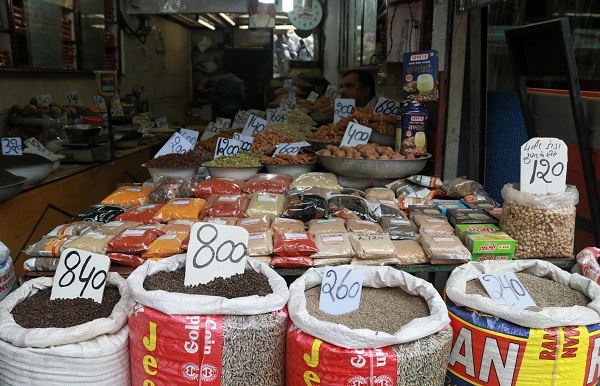
New Delhi, Lower prices of key motor fuels along with food articles softened annual rate of inflation, based on wholesale prices, to 1.08 per cent in July from 2.02 per cent in June.
Similarly, the Wholesale Price Index (WPI), released by the Ministry of Commerce and Industry, showed a decelerating trend year-on-year as inflation had risen to 5.27 per cent in July 2018.
“The annual rate of inflation, based on monthly WPI, stood at 1.08 per cent (provisional) for July (over July 2018) as compared with 2.02 per cent (provisional) for the previous month and 5.27 per cent during the corresponding month of the previous year,” the Ministry said in its review of “Index Numbers of Wholesale Price in India” for July.
The build-up inflation rate in FY20 was 1.08 per cent against 3.1 per cent in the year-ago month, it said.
On a sequential basis, the expenses on primary articles, which constitute 22.62 per cent of the WPI’s total weightage, increased to 5.03 per cent from 6.72 per cent.
The prices of food items increased at a slower rate of 6.15 per cent from 6.98 per cent.
The cost of fuel and power, which commands 13.15 per cent weightage, deflated to 3.64 per cent from 2.20 per cent.
On a YoY basis, expenses on primary articles, which constitute 22.62 per cent of the WPI’s total weightage, increased to 5.03 per cent from 2.04 per cent. On the other hand, prices of food items increased at a faster rate of 6.15 per cent from (-) 2.1 per cent.
While price of potatoes declined 23.63 per cent, onion increased 7.63 per cent. Overall vegetable prices in July rose 10.67 per cent against decline of 13.58 per cent in the year-ago month.
The cost of fuel and power category declined 3.64 per cent against a rise of 18.1 per cent YoY. Among motor fuels, price of high-speed diesel declined 3.72 per cent from 22.84 per cent YoY, petrol fell 5.02 per cent from 20.75 per cent.
Expenses on manufactured products registered a 0.34 per cent rise against 4.53 per cent.
On Tuesday, another set of official data showed that retail inflation in July softened a bit to 3.15 per cent from 3.18 per cent in June, and 4.17 per cent year-ago on lower fuel prices.
According to the National Statistical Office (NSO) data, the consumer food price index (CFPI) increased 2.36 per cent in July against 2.25 per cent in June and 1.30 per cent in July 2018.
“A sharper than anticipated dip in core inflation to a marginal 0.2 per cent resulted in the WPI inflation for July 2019 printing considerably lower than our forecast of 1.9 per cent,” ICRA Principal Economist Aditi Nayar said.
“Weak commodity prices, a mild appreciation of the INR as well as a lack of pricing power contributed to the sharp and fairly broad-based fall in the core inflation to a 33 month low 0.2 per cent in July 2019.”
According to Madhavi Arora, Economist, Edelweiss Securities: “The current growth-inflation mix has been favourable for counter-cyclical monetary stance and with inflation likely to remain sub 4 per cent in the foreseeable future, the MPC will likely focus on tackling weaker growth dynamics as wide output gap continues to persist. We see scope for more easing, with terminal repo rate at least towards 5 per cent in this easing cycle, admittedly contingent on data outcomes.”
“However, we will closely watch for the evolution of inflation and growth amid various domestic and global idiosyncrasies, possible fiscal fragilities and global financial conditions that could impact the MPC’s reaction function.”
Emkay Global Financial Services Currency Research Head Rahul Gupta: “The drop in retail and wholesale inflation clearly states that the 110 bps rate cut transmission is still not observed, keeping a room open for one more rate cut in the future. If not a rate cut then RBI may force banks to reduce their MCLR in order to revive consumer demand.”









